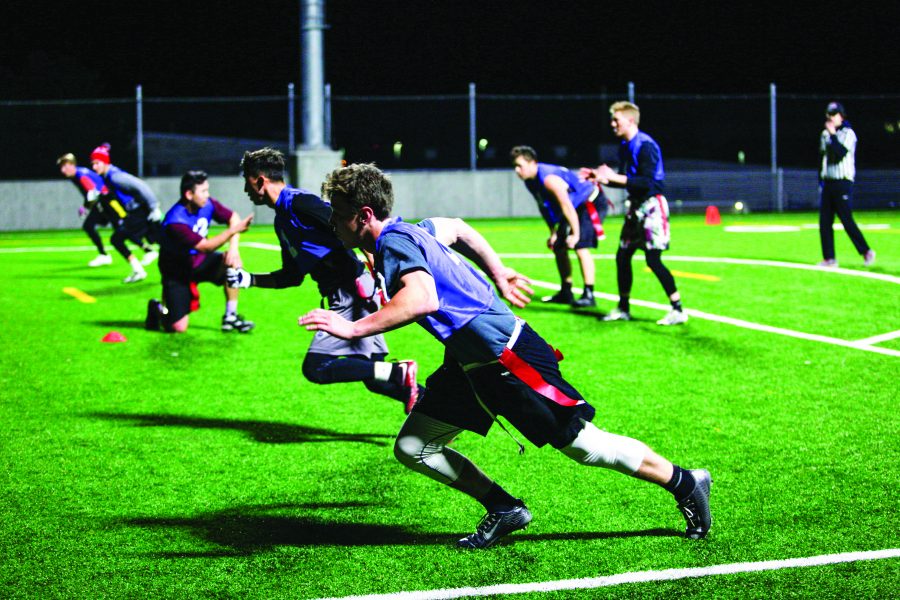Athletes choose to play or not play college sports for any number of reasons. They might be tired of their sport, they might have different academic aspirations or they might not be able to perform at the collegiate level. For those high school athletes, an abrupt stoppage of play can be detrimental to their schedule, health and even focus. At the University of Utah, however, there is an extensive intramural sports program which runs through Campus Recreation Services in the George S. Eccles Student Life Center.
The intramural program offers five sessions of competitive team play throughout the Fall, Spring and Summer semesters. Team sports such as indoor and outdoor soccer, volleyball, basketball and flag football are available for people with a gym membership.
“The intramural program at the U is essentially an opportunity for all students to compete, challenge themselves and stay active through organized sporting events put on by a group of dedicated and passionate people,” said intramural supervisor Scott Stephens. “We love seeing participants enjoying themselves, the competition and the ability to still play the sports they love.”
Sean Monnier, the manager of intramural sports and sport clubs, discussed how he has made a push during his two years in the position to make everyone feel safe and welcome while they are participating with the program.
“We make it a part of intramurals to always be inclusive. Our supervisors and our staff are always on the lookout for anything that makes anyone uncomfortable because that’s not what we are trying to do here,” Monnier said. “Regardless of where they’re from, what they’re wearing, what they believe, what they speak, anything like that. It doesn’t matter, we just want to get them out on the court, out on the field playing games and letting off some steam from the challenge of college.”
It is important that all athletes are able to express themselves in a manner that makes them feel comfortable and that is also safe for the other athletes in the program. Because of this, jewelry of any kind is not allowed on the playing field at any time. All of the student employees in the program are responsible for making sure that jewelry is removed before play.
In terms of religious memorabilia, it is required that participants remove necklaces, earrings and bracelets for the duration of play.
“For us, it’s all about safety. When our supervisors have an issue with jewelry or any other kind of equipment or apparel that could be dangerous, it’s all about safety. That is all that we take into consideration,” Monnier said. “We allow medical alerts just in case we have a participant that is diabetic or has another medical issue that they have to have that identification on them at any time. In those situations we make the exception to tape it.”
Although jewelry is not allowed during play, participants are allowed and encouraged to express themselves in any other ways. One of those ways is through clothing.
Serene Kergaye is in her fourth and final year at the U where she studies biomedical engineering. Kergaye can be found in the gym almost every day of the week working out or playing in a game of pickup soccer.
This Utah native practices under the Muslim religion and because of this, she wears a hijab, which means “scarf” in Arabic.
In all of her years of playing competitive sports, Kergaye has yet to experience negativity towards the clothing choices that she makes. She is not held back by any obstacle, and she knows how to compete well while wearing additional clothing.
Kergaye described how her hijab is about the same length as her hair, so it does not feel like any additional material around her, and it stays out of the way while she is playing.
Wearing a hijab keeps Kergaye’s hair off of her neck, which cools her down during games. Sometimes, contact with the ball during headers will push back the material of the hijab during play, but it is easy for her to fix, and she can continue playing quickly.
“There are always accommodations,” Kergaye said. “There is always going to be a way around it, so you don’t ever have to give in or give up. People are usually really understanding and they will try to work with you.”
Overall, Kergaye’s experiences with mixing religion and sport have been positive for her and she has been able to happily and freely compete while attending the U.
This article is part of the Poynter College Media Project. Click here for more stories and information on the topic “Are U Mormon?”




